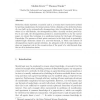Free Online Productivity Tools
i2Speak
i2Symbol
i2OCR
iTex2Img
iWeb2Print
iWeb2Shot
i2Type
iPdf2Split
iPdf2Merge
i2Bopomofo
i2Arabic
i2Style
i2Image
i2PDF
iLatex2Rtf
Sci2ools
JAPLL
2006
2006
Deduction chains for common knowledge
Deduction chains represent a syntactic and in a certain sense constructive method for proving completeness of a formal system. Given a formula , the deduction chains of are built up by systematically decomposing into its subformulae. In the case where is a valid formula, the decomposition yields a (usually cut-free) proof of . If is not valid, the decomposition produces a countermodel for . In the current paper, we extend this technique to a semiformal system for the Logic of Common Knowledge. The presence of fixed point constructs in this logic leads to potentially infinite-length deduction chains of a non-valid formula, in which case fairness of decomposition requires special attention. An adequate order of decomposition also plays an important role in the reconstruction of the proof of a valid formula from the set of its deduction chains.
Related Content
| Added | 13 Dec 2010 |
| Updated | 13 Dec 2010 |
| Type | Journal |
| Year | 2006 |
| Where | JAPLL |
| Authors | Mathis Kretz, Thomas Studer |
Comments (0)

